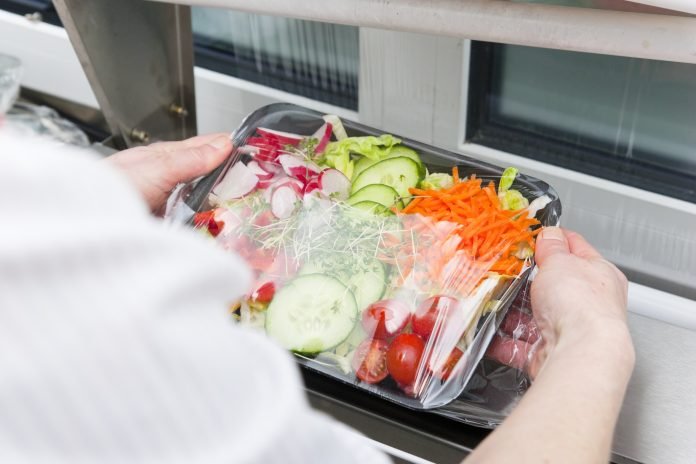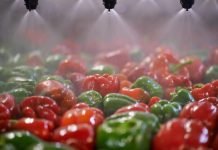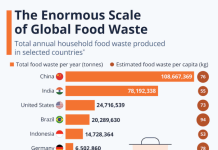
India’s food production is the second largest in the world behind China, amounting to US$ 849 billion, or Rs 75.3 lakh crore (also 75.3 trillion) in 2025, representing 20.3% of the country’s GDP of Rs 372 lakh crore or US$ 4.19 trillion. A global leader in food production, India ranks second worldwide in total farm output after China, and is the world’s leading producer of milk, pulses, and spices. India is the second-largest producer of fruits, vegetables, and food grains, including rice and wheat, with significant positions in other categories, such as being the world’s top producer of buffalo meat and the second-largest producer of eggs and tea.
According to our conservative estimate, the processed food sector, including exports and the food service sector, processing, supply chain, and packaging value addition, is said to be the sixth largest in the world, totaling US$ 232 billion, or approximately Rs 205 lakh crore. The market value, including distribution and retail costs, would further rise to US$ 300 billion. Projected annual growth estimates vary from 5.5% to 8.8%.
The Indian government permits 100% foreign direct investment (FDI) in food processing and the retail trading of food products, including eCommerce, through its automatic routes. From April 2000 to December 2024, the sector received FDI worth US$ 13.01 billion, with more than US$ 7 billion in the past eleven years.
The Indian food industry, including its cold chain logistics, processing, exports, food service, and retail, is the key driver of the brick-and-mortar economy. Regenerative agriculture, modern logistics, and processing are the keys to a circular food economy. Innovations in agriculture, food ingredients, and products require sustainable technologies in processing and packaging, including the use of data collection, track-and-trace, and artificial intelligence at every step of the supply chain.
The FoodTekPack Conference on 11 and 12 December 2025 at the Greater Noida Expo Center will knowledgeably discuss and structure the opportunity to bring food that is being produced in the country to market. To create new products, adding value and efficiency can help avoid the vast amount of food waste in India, currently estimated to be as high as 75 million tons or 55 kilograms per capita. (United Nations Environment Programme’s Food Waste Report of 2024.)
A star-studded list of industry speakers from the major food brands, producers, and audience of actors, who are daily investing in every aspect of the food supply chain, will make this an exciting and unique face-to-face event. Tech innovations in agriculture, sorting, processing, cold chain, filling, sealing, packaging, energy saving, and recycling will be discussed.
Specialist speakers, and panelists, along with practitioners, experts, and growth-oriented entrepreneurs and professionals, large and small global and Indian food brand owners, food processors, cold chain facilitators, packaging, filling and sealing, and material providers will interact in each session to share their experience, insights, and questions.
Confirmed speakers include include Swarn Singh Grover, director R&D Kellogg’s India, Sandeep Ghosh, business head DS Spices, who will deliver a keynote on the food and spice processing industry, Vaibhav Vijay Dugar, founder of Vaarya Foods, Prabhod Halde, head Global Regulatory, Public Policy and Advocacy Marico Group, Mani Vajipey, co-founder and CEO of Banyan Nation, Ritesh Dhingra, managing director of Multiva Laraon India, Barun Banerjee, chief technical officer of Jupiter Laminators, and, Srikanth Ramamurthy, Liquid Packaging Division, Parksons Packaging. We are expecting many more spice, food, alcobev brand owners, processors, cold chain, packaging material, and recycling experts to join the list. Take-Home Value
Having organized over 40 conferences and industry knowledge events since 1994, the IPP Group’s FoodTekPack is a conference, ‘With Take-Home Value.’ Join us in a technological and business celebration of the Indian Save Food movement – an event that discusses food production, processing, supply chain, packaging, and logistics in the contexts of automation, efficiency, and sustainability.
The detailed conference program, available on our website, includes sessions on the Indian SaveFood Movement; responsible cultivation, sourcing, and sustainable processing and packaging of food; and tech innovations for sustainable farming. Food processing for the domestic cold chain and exports; The circular food economy, food and beverage product and process innovations to convert waste food into protein, and to convert waste food into packaging. The FSSAI compliance and trends update. Brand protection, anti-counterfeiting of inputs and food products will be taken up.
Topics include food packaging technologies and machine automation; Modernization of packaging machines for sustainable material; and the Optimization of packaging machines using data and AI. There are sessions on Recyclability and compliance with Extended User Responsibility; New structures and the paperization of packaging; and how to make the US$ 5-9 billion business opportunity of waste recycling a reality. The conference is supported by institutions and associations, including ASPA.















